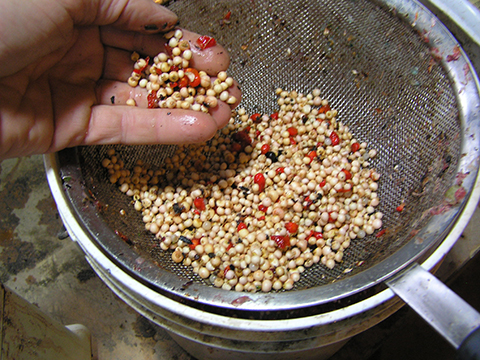 |
| Home | Ordering By Mail | Purchase Manual: Using Native Plants in Urban Landscapes |
|
|||||
Species Name: Arisaema triphyllum
Common Name: Jack in the Pulpit
Zone: 3 to 9
Distribution: Nova Scotia south to Florida .
Seed collection: Fruits turn a scarlet red in late September in upstate New York. Collect fruit after it turns color. The fruits are produced in a cluster on the end of the flower stalk. Fruits are only produced on female plants. The fruits persist on the plant for a month or more after the foliage has withered and then the cluster begins to break apart and the individual fruits fall to the ground. Each fruit contain a couple of round B.B. sized, ivory-white seeds.
Seed handling: Chemical inhibitors in the fruit delay germination and should be removed by cleaning. Remove the seed from the fruit by macerating and floating off the pulp and skins. The sound seed will sink to the bottom. Oxalic acid in the pulp may be irritating to bare skin, so where gloves when handling fruits. Do not allow seed to dry as seed loses viability rapidly. Store cleaned seed in moist potting media for storage and spring planting.
Germination requirements: Seed can be planted immediately or stored for later planting. Sow seed from 1/4 to 1/2 inches deep or scrape away the leaf litter , sprinkle a few seeds on the soil surface and then replace the leaf littter. Planting seed directly into the soil in the fall gives good results with a high percentage of germination occurring the following spring. Some seed will germinate in following years. Seedlings are small the first year. Young plants are all male, after the plants has grown for a couple of years and stored up suffient food reserves the plant reverts from male to female and begins to flower and produce fruit.
Ecology: Jack-in-the-pulpit (JITP) grows in moist rich woodland soils, high in organic material. Soil pH can ranged from slightly acid to neutral. The plant grows from a perennial corm that overwinters. It is often found growing in association with other woodland herbs like False Solomon seal, Blue cohosh , Blood root and many others. JITP readily reproduces from seed but it is more productive to collect and sow the seed to increase reproduction than to leave it up to nature. JITP is quite deer resistant and should be encouraged where deer pressure is high.
JITP fruit ready for collection in the fall.The leaves have senesced.
Each fruit contains a couple of seeds. Fruit contains a chemical inhibitor. Remove the pulp to increase germination.

Clean seed after macerating in a food processor and floating off the pulp and skins
this page updated January 20, 2014